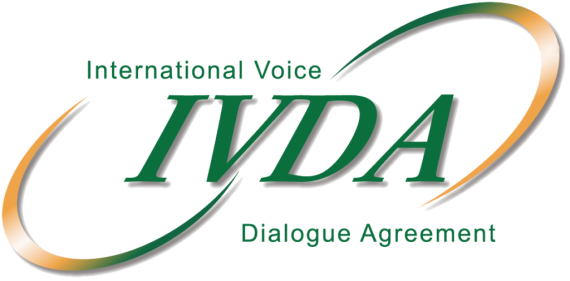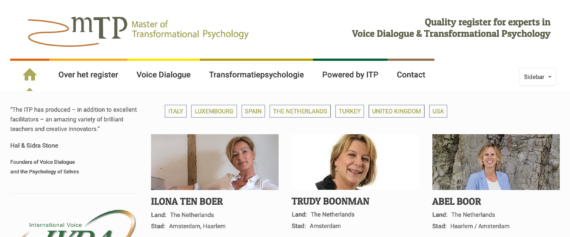Premise
The following document aims to provide an orientation for Voice Dialogue facilitators and teachers. The knowledge of these guidelines will help clients and students interested in receiving Voice Dialogue facilitations and courses in choosing the people to work with.
Introduction
In developing Voice Dialogue, Hal and Sidra Stone were looking for an open system, without any hierarchy; therefore, not to certify practitioners was a choice they made very early in the process. Consequently, the method could be applied in combination with other methods and integrated into different disciplines.
As a result, the work has spread, and is leaving its mark in a growing number of fields. To name a few: personal development, psychotherapy, psychiatry, coaching, organizational development, counseling, relationships, conflict resolution, creative and performing arts, meditation, writing, intercultural communication. Voice Dialogue is now – in different degrees of depth – taught in a great variety of educational trainings, including University Master’s programs.
The work continues to develop in many countries: Argentina, Australia, Austria, Belgium, Bulgaria, Canada, Denmark, England, Estonia, Finland, France, Germany, Holland, Israel, Italy, Mexico, New Zealand, Norway, Korea, Poland, Russia, South Africa, Spain, Sweden, Switzerland, Thailand, USA.
All this is very satisfying, however, there are several drawbacks. Because of the lack of certification and quality control, more and more people offer Voice Dialogue sessions and courses after minimal or outdated training. This causes problems for someone who is looking for an experienced Voice Dialogue facilitator/teacher, and for many committed facilitators who have been involved in the work for years.
So, for clarity and to protect the credibility of the term “Voice Dialogue facilitator”, a need is felt for the establishment of guidelines for maintaining quality criteria. However, we want to be aware of the pitfalls of rigidity, certification and hierarchy. What is important here is to use an Aware Ego process in order to strike a balance between criteria and rules on one side and freedom and creativity on the other.
Another set of opposites is similar but even deeper than these. They are the opposites of form and spirit. With Hal and Sidra, we hope that over the years the spirit of this work will continue to shine through the facilitators and teachers. At its deepest, the development of an Aware Ego Process is a mindful practice – a psycho-spiritual practice. So, in the setting of standards of quality, we are concerned about not killing the soul of the work.
Over the summer of 2008, a “Think Tank” developed with the support of Hal and Sidra Stone. This group was formed by:
- InnerTeam, Italy (Franca Errani and Giovanni Civita).
- ITP, Netherland (Robert Stamboliev and Maria Daniels).
- Osiris Conseil, France (Geneviève Cailloux and Pierre Cauvin).
- The Voice Dialogue Institute, USA (Miriam Dyak).
- Voice Dialogue Center North West, USA (J’aime ona Pangaia).
- Voice Dialogue Connection, USA (Judith Tamar Stone).
In the fall of 2008 at the NY Convergence of International Voice Dialogue Teachers organized by Martha Lou Wolff, these issues were discussed further and suggestions from the Convergence as well as many other senior teachers and facilitators contacted by the IVDA Think Tank were incorporated into this final document.
Criteria for Quality Of Voice Dialogue Work
A Guideline
-
For a Voice Dialogue Facilitator
What makes Voice Dialogue work effective? What skills are needed to become a Voice Dialogue Facilitator?
The Voice Dialogue Facilitator is well versed in the theory of the Psychology of Selves and knows and understands its different elements: primary and disowned selves, vulnerability and power, instinctive and transpersonal energies, bonding patterns in relationships, dreams, archetypes, energetics and facilitation skills. In addition, the Voice Dialogue facilitator has been in and continues to be in an extensive process by working with these elements, experiencing them deeply and integrating them over time.
The guidelines we will describe here live within a process rather than a stationary condition. They may be developed and polished without limit; on the other hand, they can be lost if one does not continue one’s own personal process (even if one is experienced in the work). To become and continue to be a skilled Voice Dialogue Facilitator, it is highly recommended to have an active practice of being facilitated on a regular basis. This supports the facilitator to really surrender to one’s own process, and find out, from one’s experience of being facilitated, what does and does not actually work. This will also allow the Facilitator to personally experience a wider assortment of inner selves that can later be drawn upon through an Aware Ego process when facilitating someone else.
Because Voice Dialogue work is a process to which each facilitator brings a unique set of skills, talents, and life experiences, there is no hard and fast rule about how long such a developmental process will take. It is our experience that it can generally take between three to five years to become an experienced and transformative Voice Dialogue facilitator, if the person is already experienced with working energetically or psychologically with others. If the person has not yet developed good listening and interpersonal relationship skills, either personally or professionally, the process may very likely take more time.
We have found that the development of the individual process includes the following elements:
Being facilitated regularly in order to:
- Be aware of one’s own primary and disowned selves as an on-going.
- Work with an ever wider range of selves.
- Separate from a number of core polarities.
- Be aware of one’s own vulnerability.
- Have awareness of – and accountability for – one’s own bonding patterns in relationships.
Developing:
- Contact with one’s own body, breath and voice
- A relationship with the Unconscious through dreams and daydreams, as well as exploring the deeper layers of the archetypal and transpersonal levels of the psyche
- Experience with energetics – such as being centered, alert, relaxed, aligned – as well as having an ongoing practice in paying attention both to the energy of one’s own selves and to the energetic connection (linkage) between oneself and others.
In looking at the skills needed to be a Voice Dialogue Facilitator, we see that these are partly the result of one’s own process of consciousness, and should also have a sound basis in theory and training.
These skills include the following:
- Being able to assess which clients to accept and which to decline or refer to a competent specialist. This is the first safety mechanism for good practice and is particularly important for those facilitators who are not psychotherapeutically trained.
- A practiced ability to facilitate from an Aware Ego process, as the premise for a true unconditional acceptance of the client and for holding/modeling the client’s Aware Ego process.
- Staying conscious of bonding patterns that may arise between client and facilitator (transference and counter transference) and taking responsibility for one’s participation in the pattern.
The process of becoming a skillful Facilitator is a process of learning, which is not linear, and includes the following steps:
1st Step
- Receiving initial and ongoing training in Voice Dialogue theory and practice.
- Receiving sessions from an experienced facilitator on a regular basis.
- Observing experienced facilitators doing Voice Dialogue facilitation.
- Practicing Voice Dialogue facilitation with peers under supervision.
2nd Step
- Facilitating Voice Dialogue with clients on a regular basis.
- Making arrangements for an ongoing process that affords objective feedback regarding facilitation and personal process. This arrangement can take many forms.
Being a seasoned, experienced Voice Dialogue facilitator is a developmental process. There will be a moment when the skillful facilitator feels more and more comfortable with the work and has a sense of embodiment, knowledge and skill. Then s/he can work independently, while still maintaining his/her personal process and continuing education in the work.
-
For a Voice Dialogue Teacher
It is not essential for facilitators to become teachers, but in order to do so, one first has to be committed both to use Voice Dialogue in one’s own personal process and to facilitate others. According to our experience the process of becoming a Voice Dialogue teacher includes the following elements and development of skills in addition to those needed for facilitation:
- Be an experienced facilitator (at least 3 to 5 years).
- Be a teaching assistant in Voice Dialogue training programs.
- Practice teaching of parts of a training under supervision.
- Have experience and skills in using energetics in groups.
- Have didactic and group dynamic skills.
Ethical guide-lines
Ethics refers to the facilitators’ and teachers’ behavior both with clients, students and also with colleagues. The following are what are considered to be some of the most important values for a Voice Dialogue Facilitator or Teacher:
- Continuing one’s own Voice Dialogue process.
- Maintaining confidentiality around client’s identity, issues, and work.
- Working in accordance with one’s own competence and the client’s needs.
- Being clear with the client about the facilitator’s professional orientation (such as coaching, counseling, therapy…) and about what the client can expect.
- Referring clients to specialists if needed*.
- Not using the relationship with the clients or students to one’s own advantage or benefit.
- Respecting the right of the client or student to terminate the relationship at any point.
- Being aware of one’s own limits as a facilitator and referring the client to another facilitator if required.
- Staying conscious of bonding patterns that may arise between client and facilitator (transference and counter-transference) and taking responsibility for one’s participation in the pattern; paying great attention to not getting involved in a romantic or sexual way with a client or current student.
- Being committed to dealing with any of one’s own interpersonal issues amongst colleagues.
- Respecting the client’s former facilitators.
- Maintaining transparent and clear professional relationships within the Voice Dialogue community.
- Complying with the laws of one’s country and state regarding professional practice guidelines, obligations and limitations (i.e. practicing within scope of license), professional reimbursement and taxes, legal structures for professional practice.
* Voice Dialogue practitioners/teachers, especially those who are without formal training in clinical psychology, need to learn to recognize the warning signals of mental illnesses/disturbances – psychosis, depression, personality disorders, etc. – This knowledge helps Voice Dialogue practitioners/teachers, among other things, to determine when they ought not to work with/train someone but instead refer that person to a competent specialist. In any case, Voice Dialogue cannot be a replacement for medical care.
IVDA guidelines for Resource Directories
The following points, in line with in the Agreement, to be listed in Resource Directories, are:
- name
- name & address of business
- e-mail and website (direct link)
- Language(s) spoken
- Background: qualifications (profession, regular studies, trainings in other methods)
- Voice Dialogue training: where, when, which teachers, how many hours/days/years
- Continuing education and/or supervision in Voice Dialogue: list the most recent experience, last supervision, conference, workshop…
- Personal key-aspects of the work: target group(s), integration with other techniques, short description of practice.
It is expected that members will take responsibility about the information they put on this list and will update it annually. All data should be verifiable.
*****
Hal and Sidra Stone about the IVDA Agreement:
“We applaud the tireless effort and the continuing commitment of the original IVDA “Think Tank” team in spearheading and taking responsibility for the development of these documents. This represents a tremendous effort on their part. We are pleased that they have taken steps to include the cooperation and input of the wider international Voice Dialogue community and we understand that they have done their best to include this additional input.
These efforts have produced excellent results. We feel that these documents maintain the basic spirit of the work – and the underlying psycho-spiritual values that it represents – even as they present criteria to protect the quality of facilitation and teaching. The spirit of the work is protected by the sense of continuing process, the space for the evolution of consciousness (or the expression of the organizing intelligence of the universe), and the avoidance of rigid requirements because each individual’s path-and Aware Ego Process-is unique. The commitment to quality and proper safeguards are well represented by the presentation of ethical guidelines and an enumeration of recommendations both for the basic skills and the ongoing process necessary for competent facilitation and teaching.”
Hal Stone and Sidra Stone
Albion, September 2009
















